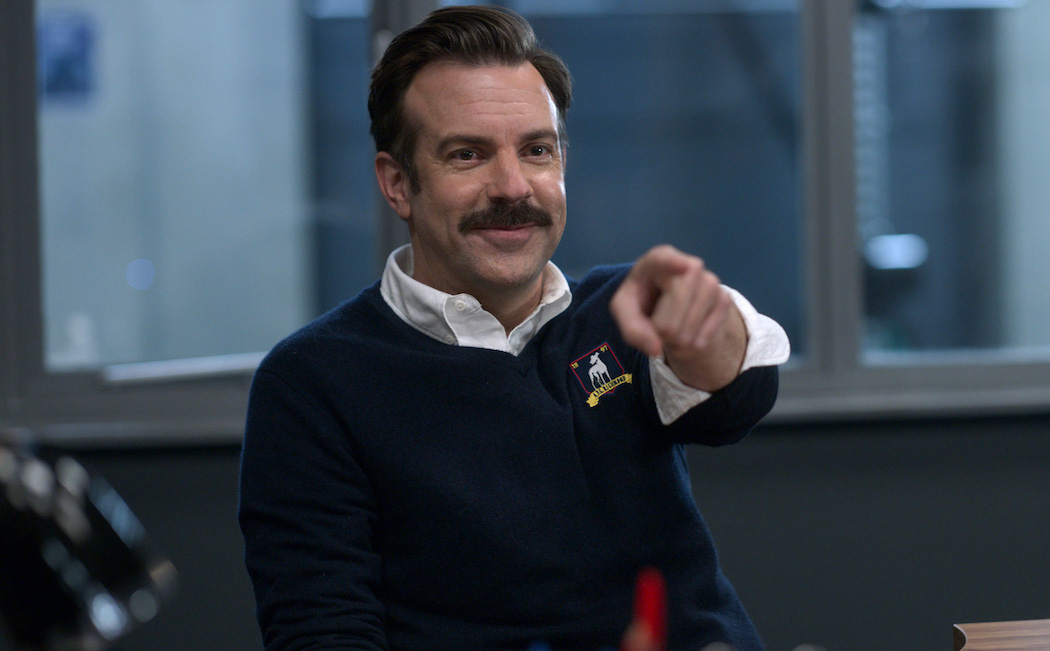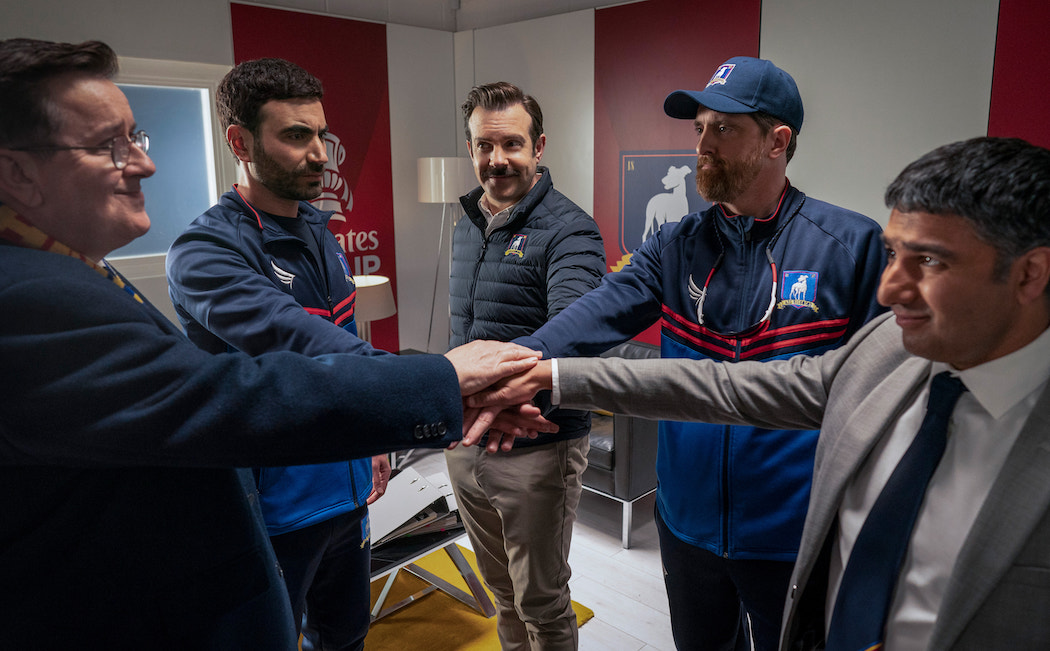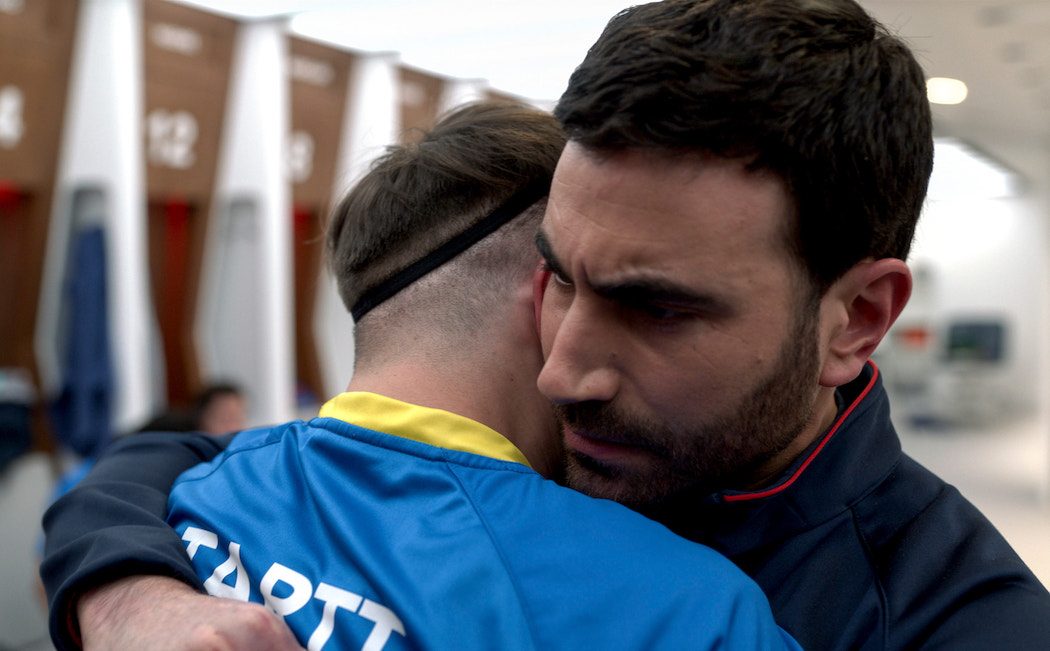TU professor: Ted Lasso has lessons for Super Bowl and beyond
Andrew Reiner’s work on healthy masculinity converges with hit TV show and sports culture
February 7, 2022

Like the supporting characters in his show, “Ted Lasso” came into TU lecturer Andrew Reiner’s life at just the right time.
During the last two years, Apple TV’s feel-good comedy series has won the hearts of viewers and Emmys. The titular character, an American college football coach, moves to England to take over a middling professional soccer team, AFC Richmond. On the surface, the show is a fish-out-of-water story about a coach who wins over the clubhouse and the fans with his charm. The show is digging at more, however, as it takes on the topic of mentorship, masculinity, fandom, friendship and the struggle against toxicity.
Reiner teaches the seminar "The Changing Face of Masculinity" in the Honors College. He’s written an essay for “The Washington Post” magazine on normalizing men crying and many pieces in “The New York Times” about the need for healthier forms of masculinity, including a viral one on teaching men to be emotionally healthy.
Reiner’s first book, “Better Boys, Better Men,” (HarperOne) was published in late 2020 and argued that American men are working with an outdated model of masculinity that ultimately has a negative effect on everyone. Like his Washington Post and New York Times articles, "Better Boys, Better Men" calls for the same things Ted Lasso models as a coach: emotional resiliency.
Lasso debuted the same year Reiner’s book was released.
Says Reiner, “Every time I watch the show, in my mind I'm saying to myself, ‘Yup, check off that box for unproductive masculine behaviors. And check off that one for healthy masculine behaviors.’”
Sports fans in the United States are just a few days away from the Super Bowl LVI matchup between the Cincinnati Bengals and the Los Angeles Rams. Legacies and big money contracts are often sealed with Super Bowl victories. The pressure to perform at a high level in front of nearly 100 million people watching on television is enormous.
The themes of “Ted Lasso” feel even more prescient in a Super Bowl week such as this. Here, Reiner answers questions about what lessons can be learned from the show and if the character could ever work in the real world of professional sports.
Was there a particular moment in “Ted Lasso” where you saw your work intersecting?
The question I keep asking myself is “Where in ‘Ted Lasso’ do I not see my work intersecting with the show's themes and subtext?”
In one of the early scenes in the first episode, Lasso is doing his first press conference. Right out of the gates, I saw alignment with what my book and work is about with healthy masculinity. There's no posturing, no masking, no trying to appear “right” and in charge of the situation, as many coaches do. He's leaning into healthy masculinity with smiles, honesty and owning his lack of experience and knowledge around soccer.
Why do you think people are latching on to that?
I think many women are responding to it because they're thinking to themselves, “Finally, you guys are seeing the value in being supportive of each other—simply by more active listening, not trying to solve each other's every problem, showing empathy to each other's struggles, showing up with emotional support.”
I think a lot of men are seeing this and thinking, “Man, how great would it be to not have to always turn to female friends, girlfriends, partners or wives for this? How great would it be to finally get this from my guy buddies?” I think viewers resonate to the transformative possibility of guys learning how to support each other in ways that are typically verboten.

Why does something like The Diamond Dogs, men sharing emotions and experiences, feel so novel in popular culture?
Men showing up for each other as the Diamond Dogs do are so compelling to male viewers because this breaks the mold for how guys are expected to support and bond. Over and over in my book and article research, I've heard males of all ages talk about the expectations when guys are together. The expectation is that you don't typically bring up anything that's bothering you; you save that for one-on-one time with a friend. If you do bring up something that's bothering you, expect to be met with advice or problem-solving at best, rejection (think: laughing, sarcasm, putting the guy down) at worst. This is why most men's buddy group dynamics erode a deep sense of trust. They find that deeper trust—emotional trust—in safer spaces with the females in their lives.
I think a lot of male viewers watch the Diamond Dogs and think, “Man, how great would it be to go to my buddies with something that's upsetting me or getting me down and to be met with empathy, compassion, commiseration, bearing witness to my suffering?
There’s also a recurring theme of men and women becoming better versions of themselves, better people. What is it about Ted Lasso as a character that sets that in motion?
Ted brings out the deeper, better selves in people because he has the gold standard for leadership values in his DNA. He understands that the way to get the best out of people is to lead by example: being a great listener, always being curious, never shaming or judging, leading with empathy, finding the silver lining in a situation on and off the field/court, etc. He practices and models these values, and he creates the safe space for everyone around him to practice these behaviors without telling them to do so. This is the way you empower people to access and practice these leadership values. So much of this comes from the playbook of legendary college basketball coach John Wooden's Pyramid of Success (which is taped up in Lasso's office.)

Obviously, real and fictionalized sports are two different environments, but do you think a Ted Lasso-model of coaching/mentoring could work in the competitive world of sports?
I don't think his reflexive kindness, courteousness and assertive humility would work well in highly competitive sports cultures. He would never be given the chance on any level to show why this brand of leadership is a strength.
I do think, however, that many of the values he embraces and models are values that can translate into being highly competitive. After all, this is a skillset that is being promoted by vanguard business management and leadership coaches and gurus. We see a few examples of this brand of leadership in the legacy of Wooden, who is still lauded by many management and leadership gurus; UVA basketball coach Tony Bennett; and ex-Eagles coach Doug Pedersen, among others.
Ted Lasso often seems to struggle with the meaning of wins and losses and the existence of ties. Do you think that represents anything in our culture?
Many viewers love Lasso and his leadership style, but they think it's fantasy because the reality in our hyper-competitive culture is that if you aren't scoring victories, then you're out of a job. You're a loser. The problem with this ethos is that it puts us farther and farther away from having the time and space to shift the paradigm to one that leads to long-term success. Ted Lasso gets this. He understands the need for a more sustainable and humane leadership style that effects deep, lasting change in people on the field and off. His leadership style is much more holistic and far-reaching. This is what the best coaches (and leaders) understand: Our victories may not always be immediately apparent. Sometimes they may show up years later in our athletes who become better employees, better fathers and partners or husbands, better teachers or coaches, better citizens. Sometimes coaches' biggest victories occur long after the game is over.
The character Sam Obisanya is a great example of Lasso's cutting-edge leadership style hitting pay dirt.
If Ted Lasso were coaching the Bengals or Rams this week, what message would he convey to both teams before the game?
Two things I think he'd want to say to both teams: Be a goldfish (it's one of his mantras that became a meme). Move on from your momentary setback or perceived failure to your next challenge. Research shows that shaming players and getting down on yourself for mistakes is counter-productive.
I think he'd have some additionally helpful advice for the losing team. One of my favorite episodes is where UFC Richmond loses a close match that means it will be demoted to a lower league the next season. In the locker room after the game, Lasso says something I think ALL coaches should discuss with their athletes—their sadness. He openly discusses and normalizes everyone's sadness at that moment and finishes by saying, “There’s something worse than being sad…and that is being alone and being sad. Ain’t nobody in this room alone.”
There's so much in this that's so important for men and male athletes to hear. It's good to normalize sadness—which is ubiquitous in sports—and to tell the guys that they are sharing this together; they're commiserating and giving each other emotional support. They're receiving permission to do so from their coach.
Every athlete needs to hear this after a big loss!
Media interested in speaking with TU faculty experts can contact Matt Palmer at mpalmer AT_TOWSON.